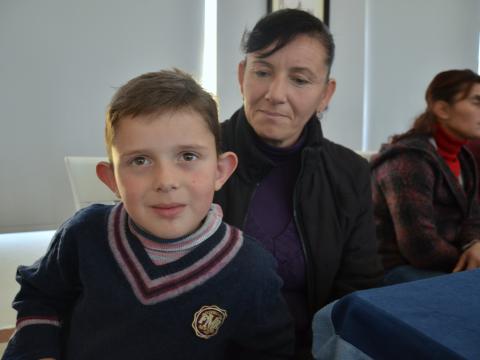What It's Like to Be Me, a story about disability inclusion in Albania

Emanuel is 7. He lives in Elbasan, in central Albania with his mother, Liljana, 40; his father and three older sisters. While it is true that every human being is unique Emanuel has something extra special. By nature, he emits light, peace and serenity. Although he is physically small and fragile, his eyes are full of curiosity and his expression says, “hey, look at me. I have something to say”.
But, Emanuel does not speak. He was born with a disability that prevents him from speaking like other children. Until the age of one, Emanuel progressed on par with his peers. “He was beautiful and agile,” remembers his mother.
It wasn’t until he reached the age of 2 that doctors discovered damage in his brain that had likely been there since birth. “While many infants in my neighborhood started to stammer, my child was not doing the same,” remembers Liljana. “It was terrible for me to notice that. Only God helped to not lose my mind about what was happening with Emanuel,” she recalls.
“It was very hard to me to get used to the reality,” says Liljana. “I could not understand his needs for food, water or to go to the toilet. He could not say a word. He could only cry. He tries hard to speak, but when he doesn’t succeed, he gets angrier and sadder.” Fortunately, although he can’t speak, he does understand much of what is said to him.
Despite his situation, Emanuel is very loving to his family and those who spend time with him. He gives great hugs and smiles when he receives complements.
Liljana said she tried to enroll Emanuel in the recommended treatments but as one parent was required to stay it simply was not sustainable for their family. “I tried to come and go from Tirana to Elbasan daily, which takes round 1 hour car driving but the travelling costs ($3 USD per day) were unaffordable,” she says.“My husband provides for our family but it is rare that he finds a job. And, I also had to care for my other children as well… I had no choice but to stop [the treatments],” she explains, noting that if there had been a centre where Emanuel could receive treatment in Elbasan, it would be much easier for him to participate.
To help Liljana and 99 other parents like here, World Vision Albania partnered with MEDPAK and Partnerë për Fëmijët NGOs to help these parents getting aware and showing them ways how to enforce the legal rights of their children. The programme is made possible by a two-year project, funded by European Union, and coordinated by World Vision.
Through the programme, parents come together and learn from each other’s experiences, sharing their sorrows, their struggles and their many questions about how to be able to provide better development opportunities for their children. In addition to supporting their increased knowledge, the programme also equips parents with the ability of advocating for their children’s ongoing needs and legal rights, by addressing the proper institutions in Albania through parent associations which are formed as a part of the project.
[Helping parents getting aware and showing them ways how to enforce the legal rights of their children, photo by Klevisa Breshani/WV]
After receiving information at the training, Liljana said: “This is good knowledge that helps us move forward, be more active and never surrender until we reach [our desired] results,” she says.
To date, World Vision and its partners have trained more than 50 parents in Dibra and Elbasan areas. Till the end of project in Spring 2016 the parents of at least 200 children with different abilities as well as the communities where those children live will have profited from the project.
“We want to contribute to the protection of children’s rights, focusing on fulfilling the rights of children with disabilities,” says Tobi Gessler, the World Vision manager of this European Union financed project, adding that: “Albania has quite modern and progressive laws for disability inclusion, but the reality on the ground is currently still far away from this legal framework. For this reason and besides the described parents trainings,more than 10 different activities which involve public institution structures and teachers are [also] happening.
We also work with youth groups and peer educators to make them aware of the situation of children with disabilities in Albania, empowering them to bring about improvement in their own schools; [having them advocate] for introduction of assistant teachers, wheelchair ramps, anti-bullying activities and more,” he ends.
Inclusive education works towards equal development opportunities for every child, and ensures that no child is ever excluded or made to feel different from other children living in his or her village or community.
***Emanuel is not a registered child in the World Vision’s sponsorship programme.